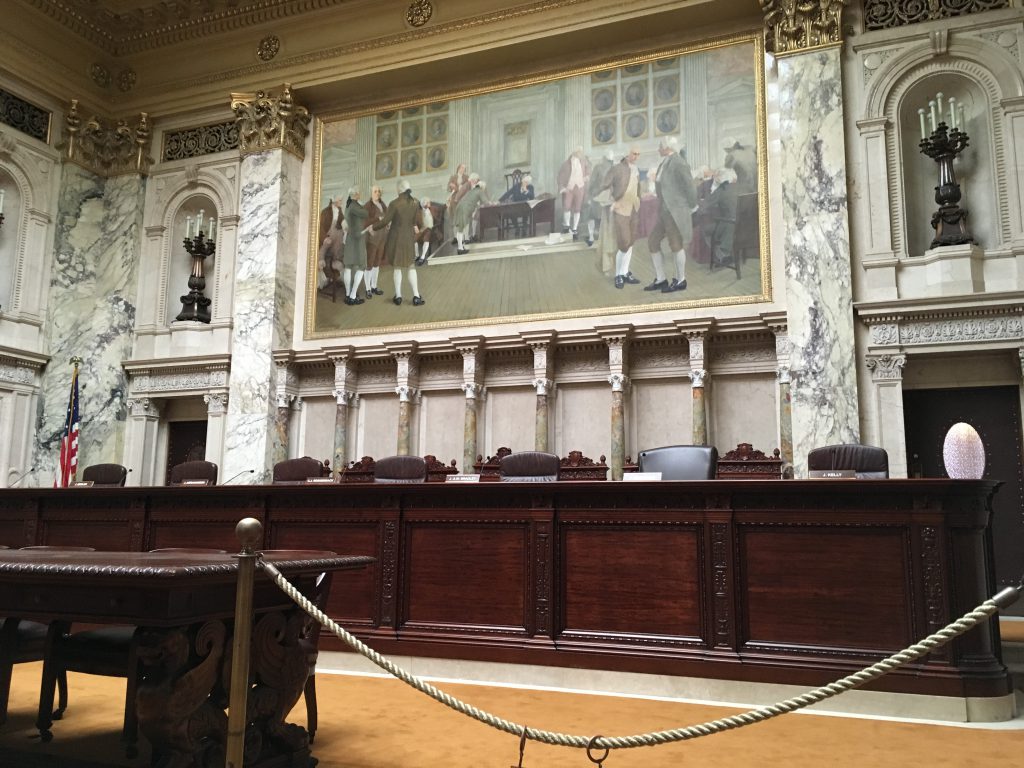Judges Ask High Court to Limit Judicial Shackling
'Every weekday, children ages 10 to 17 are brought into juvenile courtrooms in shackles.'
Five judges from around the state are asking the Wisconsin Supreme Court to adopt a new rule restricting the use of shackles on juveniles in court.
Under the proposed new Supreme Court rule, children could not be restrained during a court proceeding unless a judge found one of the following:
- Restraints were necessary to prevent physical harm to the child or another person;
- The child had a history of disruptive courtroom behavior that placed others in potentially harmful situations, or the child presented a substantial risk of inflicting physical harm on himself or herself or others as evidenced by recent behavior; or
- There was a founded belief that the child presented a substantial risk of flight from the courtroom.
Restraints use also would be limited to situations where there were no less restrictive alternatives “that will prevent flight or physical harm to the child or another person, including the presence of court personnel, law enforcement officers, or bailiffs,” according to the petition.
The rule would prohibit use of restraints “that are fixed to a wall, floor, or furniture,” the petition says.
Submitting the petition were Milwaukee County Circuit Judge Laura Crivello, Eau Claire County Circuit Judge Michael A. Schumacher, La Crosse County Circuit Judge Ramona A. Gonzalez, Dane County Circuit Judge Everett Mitchell, and Marathon County Circuit Judge Suzanne C. O’Neill. Attorneys Diane R. Rondini and Eileen A. Hirsch also signed.
“Some Wisconsin counties, including La Crosse, Eau Claire, Marathon, Milwaukee and Dane, have successfully implemented county-level juvenile court shackling rules that, like the proposed rule, establish a presumption against shackling, which can be overridden by a court finding, on the record, that the child is likely to flee, or to cause harm to self or others,” Hirsch wrote in the supporting memo. “Approximately 20 additional counties rarely shackle children in court. However, at least 25 counties practice indiscriminate shackling of children in juvenile court.”
Thirty-three states and Washington, D.C. have implemented statewide presumptions against shackling children in court, though judges can order shackles when necessary, Hirsch wrote.
Those emotions can lead to defensiveness, avoidance and aggression, she said.
Shackling can also hurt a child’s ability to communicate with counsel.
One assistant state public defender “described her shackled clients as being ‘distracted and embarrassed…They crouch down. Sometimes they have to sign papers, but it’s hard for them to sign with cuffs chained to their waists,’ ” Hirsch wrote.
Another assistant public defender said “she has had ‘numerous clients who are physically harmed by the use of shackles. I have seen red marks and indentations on my client’s wrists and legs.'”
Children with mental illness or a history of trauma suffer more harm from shackling, Hirsch said. Shackling can lead to worsening of symptoms and make daily functioning more difficult.
Hirsch cited court decisions from around the country that limit juvenile shackling.
“In each of these cases, the court concluded that a presumption against shackling during juvenile court proceedings is consistent with the rehabilitative purposes of the juvenile justice system,” she said.
The state Supreme Court has not yet set a public hearing date on the petition.
Gretchen Schuldt writes a blog for Wisconsin Justice Initiative, whose mission is “To improve the quality of justice in Wisconsin by educating the public about legal issues and encouraging civic engagement in and debate about the judicial system and its operation.”
Court Watch
-
No Unemployment Benefits For Worker Making Homophobic Remarks
 May 17th, 2022 by Gretchen Schuldt
May 17th, 2022 by Gretchen Schuldt
-
Appeals Court Upholds Injunction Against Abortion Protester
 Mar 13th, 2022 by Gretchen Schuldt
Mar 13th, 2022 by Gretchen Schuldt
-
80% of State’s Judicial Races Uncontested
 Feb 20th, 2022 by Gretchen Schuldt
Feb 20th, 2022 by Gretchen Schuldt





















